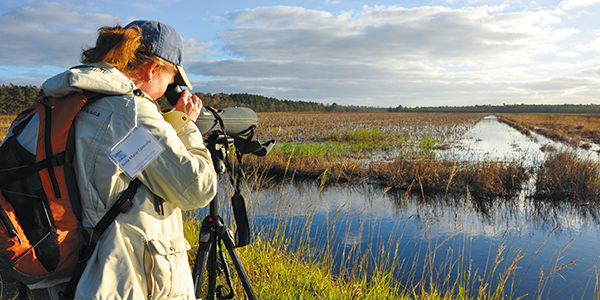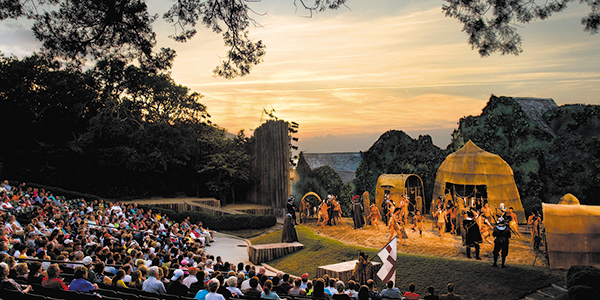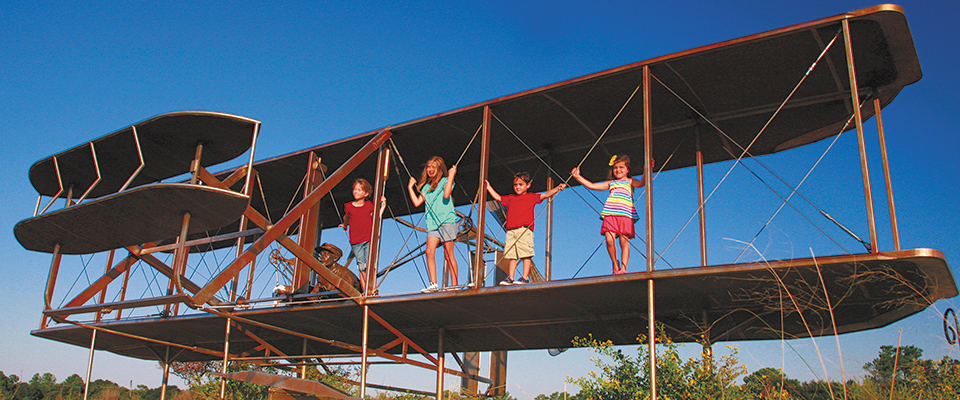Spotlight: Outer Banks/Cape Hatteras
A swashbuckling history gives way to easygoing charm on the Atlantic shore
Despite their ribbons of gorgeous white sandy beaches, the barrier islands known collectively as the Outer Banks on North Carolina’s Atlantic seaboard weren’t always desired destinations.
Together with the Crystal Coast islands just to the south, the Outer Banks region, with its shifting sandbars, was a hazard for pirate vessels and tall ships from the 16th to the 19th centuries. Later, Civil War battles and World War II submarine attacks erupted in these waters. All told, there are roughly 3,000 shipwrecks off the shores.
But for all its troubled past, the Outer Banks today a haven for anyone looking to unwind on the Atlantic coast. The islands stretch from the North Carolina-Virginia border at the north down to Cape Hatteras at the south.

The Outer Banks
Beach Fun
Beach bums and water-sports enthusiasts will find themselves in paradise. The narrow barrier islands make crossing from one type of shoreline to another quick and easy. Those seeking white sandy beaches and big waves perfect for surfing and kitesurfing can aim for the Atlantic-facing side of each island. Those seeking calmer waters for Stand-Up Paddling and kayaking can simply head the other way, to each island’s sound-facing western shores.
Another fantastic point of interest includes Jockey’s Ridge, home to the largest natural sand dune on the eastern seaboard. Hikers will enjoy Buxton Woods, where the Buxton Woods Trail Loop and Open Ponds Trail each wind through a diverse maritime-forest ecosystem.
Colorful Past Comes Alive
For history buffs, there’s no better place to start than on Roanoke Island at the Fort Raleigh National Historic Site.
It was here where, between the years 1585 and 1587, one of the first English attempts to colonize the New World was made. It began when 117 men, women and children landed on the Roanoke Island’s shores on a trip sponsored by Sir Walter Raleigh. No sooner had the colony been established than it disappeared without a trace, a nagging mystery that lingers to this day.
Today, the park is home to a museum, Elizabethan gardens and an outdoor drama troop that reenacts the history of the Lost Colony.
Further north, near Kitty Hawk and Kill Devil Hills, the Wright Brothers National Memorial commemorates a key event. It was here on the morning of December 17, 1903, that Orville and Wilbur Wright recorded the world’s first controlled powered flight, covering 120 feet in just under 12 seconds.
The Memorial includes a 60-foot monument sitting atop Big Kill Devil Hill, replicas of the 1902 and 1903 gliders and an interactive museum.

PatrickSchneiderPhoto.com
Cape Hatteras Awaits
Finally, there’s Cape Hatteras. Perched at the southern tip of the Outer Banks’ string of barrier islands, it’s home to an abundance of popular sites and attractions, including the Cape Hatteras Lighthouse, the Graveyard of the Atlantic Museum, the Museum of the Sea, the Hatteras Island Visitor Center and the Ocracoke Island Visitor Center.
For More Information
Outer Banks Visitors Bureau
877-629-4386
www.outerbanks.org
North Carolina Department of Tourism
800-VISIT-NC
www.visitnc.com





